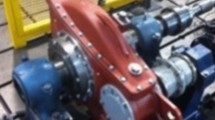Abstract
Polynomial chaos expansion (PCE) method has better fitting capacity and rate of convergence than other traditional reliability analysis methods. This paper presents the failure correlation reliability analysis based on PCE for improving calculation precision and reducing computational cost. An example of solid rocket motor grain solidification and cooling is analyzed, and the failure correlation reliability between inner surface crack and insulation layer debonding is studied. Results show that an accurate failure correlation reliability analysis result can be obtained by proposed method, and the precision and efficiency of the proposed method are verified by comparing it with traditional methods.
Similar content being viewed by others
References
J. Tang, P. He and D. Song, Reliability calculation of failure correlation components based on copula function, Journal of Mechanical Strength, 32(5) (2010) 740–744.
Y. Sun, Z. Zhang, Q. Zhang, X. Qin and L. Luo, Multiple failure mode reliability modeling and analysis in failure crack propagation based on time-varying copula, Journal of Mechanical Science and Technology, 32(10) (2018) 4637–4648.
L. Yang, K. He and Y. Guo, Reliability analysis of a nonlinear rotor/stator contact system in the presence of aleatory and epistemic uncertainty, Journal of Mechanical Science and Technology, 32(9) (2018) 4089–4101.
D. Li et al., Reliability analysis of parallel structure systems based on copula functions, Engineering Mechanics, 31(8) (2014) 32–40.
J. Zhou et al., Reliability model of copula for symmetrical structural systems, Acta Armamentarii, 32(2) (2011) 204–209.
L. He, Z. Lu and X. Li, Failure-mode importance measures in structural system with multiple failure modes and its estimation using copula, Reliability Engineering & System Safety, 174 (2018) 53–59.
X. Xu and S. Yu, Transient response analysis of propellant grain during solidification and cooling, Journal of Solid Rocket Technology, 3 (2004) 180–183.
J. Yue et al., Viscoelastic analysis of grain considering contact effect of artificial debonding layer, Journal of Solid Rocket Technology, 36(3) (2013) 338–341, 352.
R. B. Nelsen, An Introduction to Copulas, Springer, New York, USA (2006).
H. Wenqin, J. Zhou and F. Zhu, Failure probability calculation of failure correlation structure system based on copula, Machinery Design and Manufacture, 2 (2011) 183–185.
J. Wei et al., Copula-function-based analysis model and dynamic reliability of a gear transmission system considering failure correlations, Fatigue & Fracture of Engineering Materials & Structures, 42(1) (2019) 114–128.
J. Tang, P. He and Q. Wang, Copulas model for reliability calculation involving failure correlation, 2009 International Conference on Computational Intelligence and Software Engineering, Wuhan (2009) 1–4.
H. Linxiong, L. Huacong, P. Kai and X. Hongliang, A novel kriging based active learning method for structural reliability analysis, Journal of Mechanical Science and Technology, 34(4) (2020) 1545–1556.
R. G. Ghanem and P. D. Spanos, Stochastic finite element method: Response statistics, Stochastic Finite Elements: A Spectral Approach, Springer, New York (1991) 101–119.
O. Garcia-Cabrejo and A. J. Valocchi, Global sensitivity analysis for multivariate output using polynomial chaos expansion, Reliability Engineering & System Safety, 126 (2014) 25–36.
H. Wang, Z. Yan, M. Shahidehpour, X. Xu and Q. Zhou, Quantitative evaluations of uncertainties in multivariate operations of microgrids, IEEE Transactions on Smart Grid, 11(4) (2020) 2892–2903.
S. Bucas et al., Stress-strength interference method applied for the fatigue design of tower cranes, Procedia Engineering, 66 (2013) 500–507.
W. Beihai, Study on the shape of master elongation curve of hydroxyl-terminated polybutadiene propellants, Journal of Solid Rocket Technology, 3 (1997) 36–42.
H. Zhao et al., Effective robust design of high lift NLF airfoil under multi-parameter uncertainty, Aerospace Science and Technology, 68 (2017) 530–542.
Acknowledgments
This work is supported by the National Natural Science Foundation of China under Grant No. 11962021, No. 11262014.
Author information
Authors and Affiliations
Corresponding author
Additional information
Recommended by Editor Chongdu Cho
Haibin Li received his M.S. and Ph.D. in Inner Mongolia University of Technology and Dalian University of Technology, respectively. Currently he is a Professor in the Mechanical Department at Inner Mongolia University of Technology. He has published more than 30 research papers, and done research in the area of theory and application of computational solid mechanics, artificial neural network analytical method, design of press sensor and path planning for multiple mobile robots.
Rights and permissions
About this article
Cite this article
Li, Y., Li, H. & Wei, G. Failure correlation reliability analysis of solid rocket motor grain based on polynomial chaos expansion. J Mech Sci Technol 34, 3189–3195 (2020). https://doi.org/10.1007/s12206-020-0710-6
Received:
Revised:
Accepted:
Published:
Issue Date:
DOI: https://doi.org/10.1007/s12206-020-0710-6




